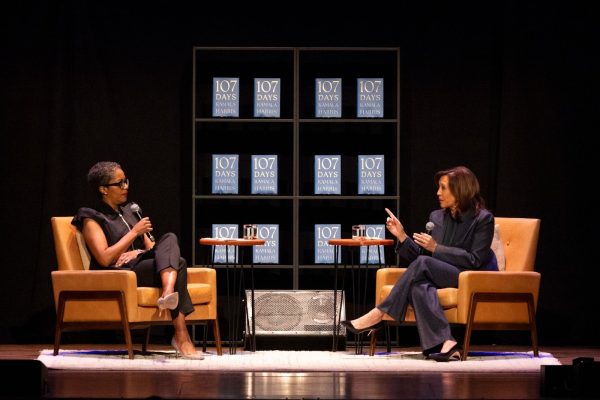
Former Vice President Kamala Harris took the stage Nov. 5 at the Arlene Schnitzer Concert Hall in downtown Portland as part of her international book tour for her memoir “107 Days,” which chronicles her 2024 presidential loss to Donald Trump.
The book covers a broad scope, discussing everything from Harris’ back-and-forth scheduling troubles with podcast host Joe Rogan, to her treasured UGG shoes stashed on Air Force Two to wear after long days in heels. The core of her book, however, is unapologetically candid about her personal history and the deep issues of her campaign; the most notable being her loyalty to Biden and the process of choosing a running mate.
However, the talk was mostly kept away from some of the main political tension points discussed in the book. Instead, moderator Rukaiyah Adams, CEO of the 1803 Fund, steered the conversation to be more personal, asking about election day, the writing process, and activism under the Trump administration.
The talk began with questions about Harris’ writing process and her life immediately after election day. “It was very cathartic, I must admit,” she said about writing, noting that during the campaign it was never her intention to write a book.
Harris said she was compelled to write the book for multiple reasons. The first was to “set the record straight.” She called out the news media for many mischaracterizations while she was on the campaign trail, hoping “107 Days” would better shape the narrative around the 2024 election.
She also wrote the book for her supporters. “Another reason for writing the book was to lift the lid on how this process works,” she said, hoping those close to the campaign would be able to get an inside look for the first time.
Harris said that the chapter about election night was the hardest part to write. “I grieved in a way I haven’t since my mother passed,” she recalled. Harris criticized the Trump administration, calling out the recent government shutdown and the lapse in Supplemental Nutrition Assistance Program (SNAP) benefits, attributing her election day grief to her prediction of Trump’s policy. “I grieved … because I knew what was going to happen,” she said. “I knew what was going to happen to the American people.”
The night of Harris’ event, at least two dozen protesters gathered outside the Arlene Schnitzer Concert Hall, denouncing her and some of the Democratic Party’s handling of the war in Gaza. They chanted and held signs, with one reading, “Gaza will be your political grave.”
Harris faced serious backlash from within the Democratic Party during the campaign, when the Democratic National Convention did not include any Palestinian speakers at the three-day event. Harris reaffirmed her support of a two-state solution in “107 Days,” calling for peace from both Israel and Hamas.
A theme of the talk that continued from the Harris campaign was engaging young people. “One of my areas of focus is Gen Z,” she said. Harris noted the particular struggles of the generation: only knowing a world in a climate crisis, losing critical education to the pandemic, and the tough job market. “The thing that I also love about Gen Z — they’re fully aware of all this and they are extremely impatient with the rest of us. They are ready to lead.”
As the former Vice President posed for a selfie with the audience at the end of her talk, she turned and thanked the crowd. She paused and then called on the high school students in the audience: “We are counting on you,” she concluded.
The talk was hosted by Literary Arts, a Portland non-profit that hosts a wide variety of literature focused events and classes. “We are honored to be bringing [Harris’] story to audiences here in Portland,” said Senior Artistic Director Amanda Bullock in a statement given to the Franklin Post. “It does speak to the strength of all of our programming and our long history in Portland that we were asked to host Vice President Harris as part of her national book tour,” she said.



































